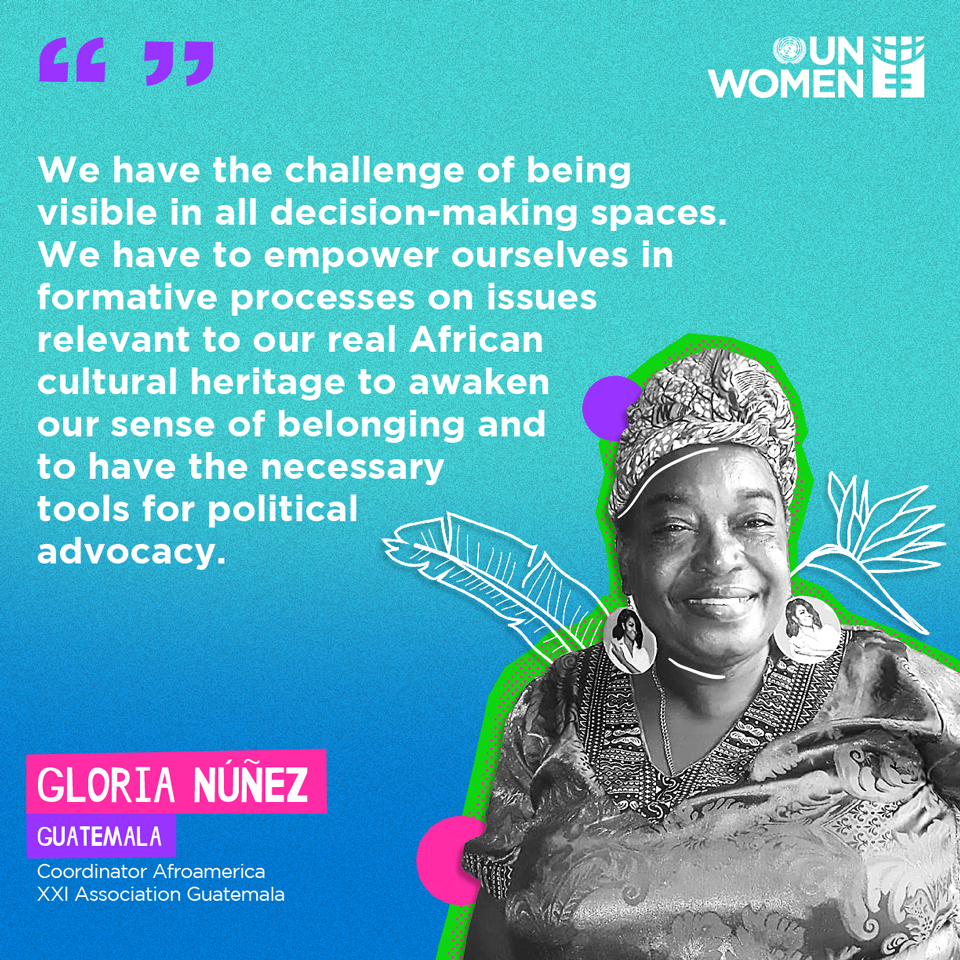Working together for the vindication of the rights and dignity of Afro-descendant women.
Twenty-nine years ago, black women from 32 countries in Latin America and the Caribbean decided to visibilize the struggles and resistance of Afro-descendant women and to define advocacy strategies in order to improve their quality of life and eradicate racism and discrimination from a gender perspective. As a result of this historic meeting in the Dominican Republic, the Day of Afro-Latino, Afro-Caribbean and Diaspora Women is commemorated every year on July 25.Date:
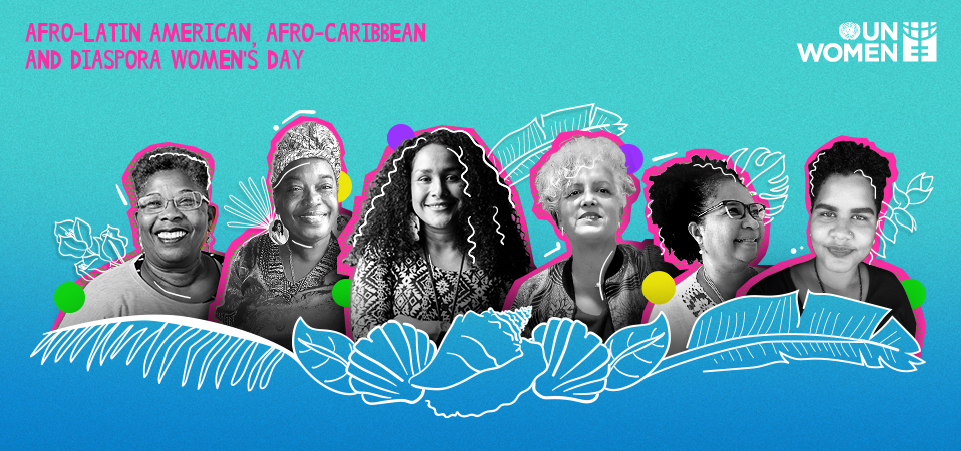
Being a woman and Afro-descendant in Latin America and the Caribbean is a challenge in which one experiences triple discrimination based on gender, race and poverty.
The debate on the economic autonomy of Afro-descendant women highlights the role played by gender inequalities and ethnic-racial status based on the sexual and racial division of labor, a product not only of the priority assigned to women of unpaid work tasks, centered fundamentally on social reproduction and associated above all with care, but also of a historical social construction in Latin America and the Caribbean that has pushed racialized people, and especially women, into precarious work in both the reproductive and productive spheres (ECLAC).
The sexual division of labor, in addition to representing a greater burden of domestic and care work for women, has as other effects precarious and informal work, wage discrimination, inequalities in access to and stability of employment and in the use and control of resources, lack of social security, disparities in affiliations to pension systems and social protection, and projections of poverty higher than that of men into old age.
María Noel Vaeza, UN Women regional director for the Americas and the Caribbean, indicates that "it is not possible to overcome the great challenges facing the region without taking transformative actions to advance in the recognition, protection and guarantee of the rights of Afro-Latino, Afro-Caribbean and Diaspora women on equal terms."
The Afro-Latin American and Caribbean Women's Network was created in search of solutions to the pressing problems that afflict them. In this special edition, UN Women interviewed a group of sub-regional coordinators of the network to assess the achievements and challenges they face almost 30 years after its founding.
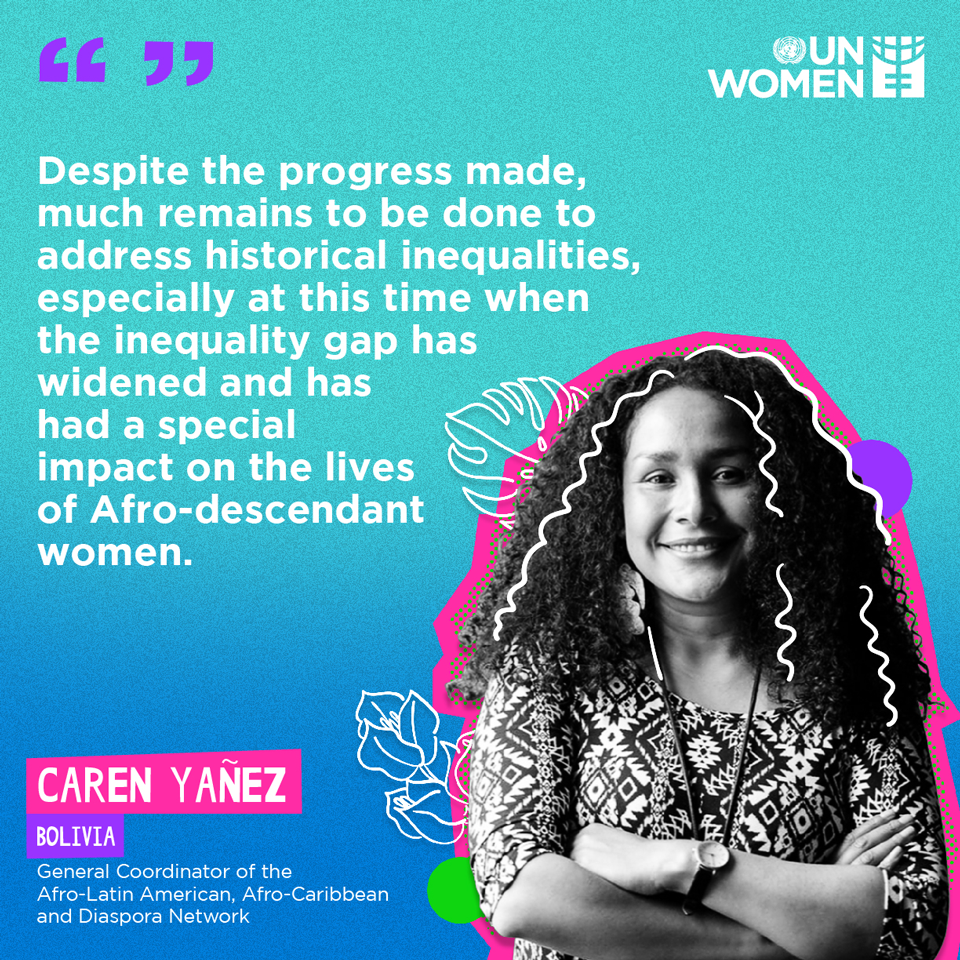
Afro-Bolivian activist Caren Paola Yañez, general coordinator of the network, which is present in 23 countries in the region, points out that, almost 30 years after the First Meeting of Black Women, the network is moving steadily to meet its objectives.
"It has become a space for the articulation of Afro-descendant women for the construction of democratic, equitable, just, multicultural societies, free of racism, racial discrimination, sexism and exclusion. We combat gender and racial oppression by exposing the marginalized conditions experienced by Afro-descendant women in the region and the struggle against the stereotypes and prejudices that have historically affected them. We promote the participation of Afro-descendant women in all spheres of public life, especially in decision-making spaces."
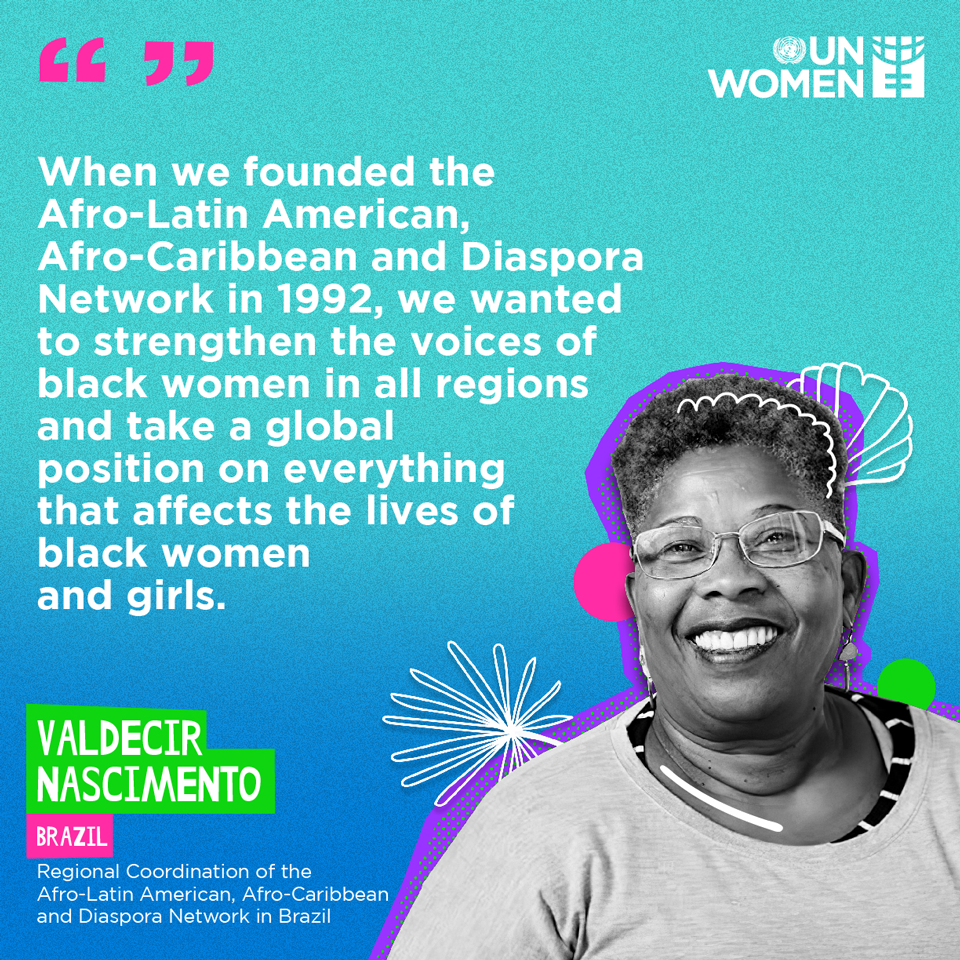
One of the objectives for which the network was formed, according to activist Valdecir Nascimento, coordinator of the network in Brazil, is to connect dialogues between Latin America, the Caribbean, the region and the diaspora, to reflect on the situation, specificities and similarities of black women's experiences. "This allows us to propose advocacy strategies that allow us to reduce inequalities, confront oppression, racism, sexism and homotransphobia."
"We cannot lose sight of the fact that when we founded the network in the Dominican Republic in 1992, we wanted to strengthen the voices of black women in all regions and take a global position on everything that affects the lives of black women and girls. Brazil's active participation in the network seeks to transform our activism into international activism."
In each subregion, the coordinators prioritize issues that contribute to improving the quality of life of Afro women in Latin America and the Caribbean, recognizing the challenges specific to their environment and seeking timely solutions that, in turn, are framed within a broader context, with regional resonance.
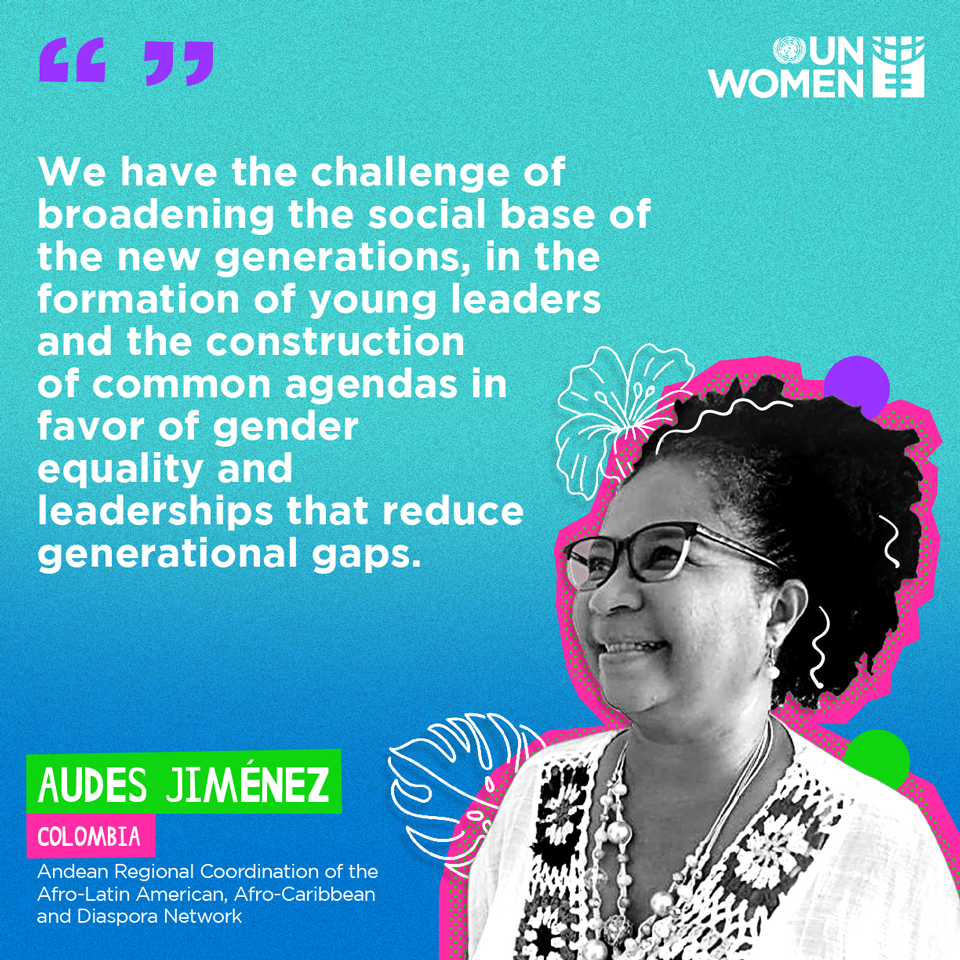
Audes Jiménez González, a Colombian Afro-feminist and human rights defender, is part of the Andean Region coordination team. "One of the challenges we face is that of strengthening and expanding the network's political advocacy at the national levels towards the construction of affirmative policies regarding women's economic autonomy, entrepreneurship and the promotion of creativity and artistic skills that project and strengthen African identity in the region."
"This challenge is also framed in the development of the school for social, cultural, economic and political empowerment of Afro-descendant women, for which we are managing technical and financial resources" adds Jimenez Gonzalez.
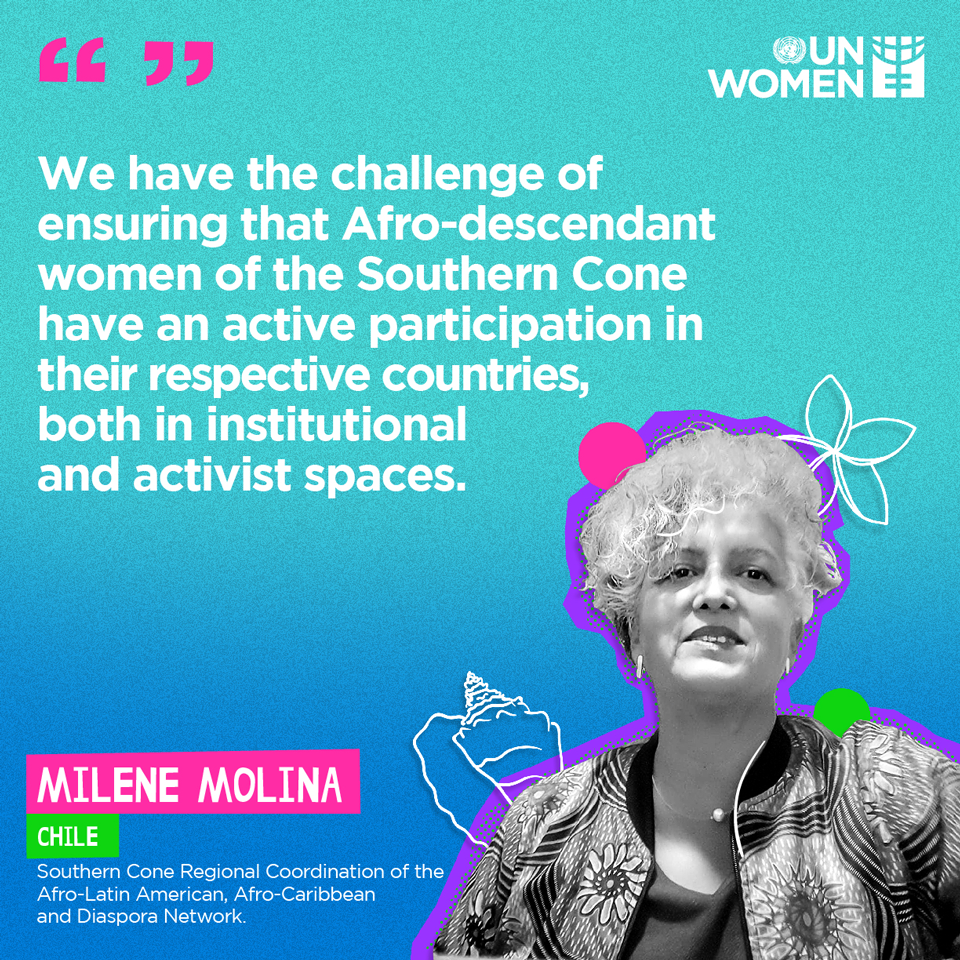
Milene Molina Arancibia, a Chilean anti-racist feminist and human rights activist, is the network's coordinator in the Southern Cone. "Our main challenge is to ensure that Afro-descendant women in the Southern Cone have an active participation in their respective countries, whether in institutional spaces or activism, and thus, through these two channels or others that arise along the way, achieve affirmative actions or public policies in favor of Afro-descendant people in their respective countries."
Increasing the capacities of young Afro-Latino and Afro-Caribbean women
According to Audes Jiménez González, part of the solution lies in broadening the social base of the new generations, in the formation of young leaders and the construction of common agendas in favor of equality and leadership that reduce generational gaps.
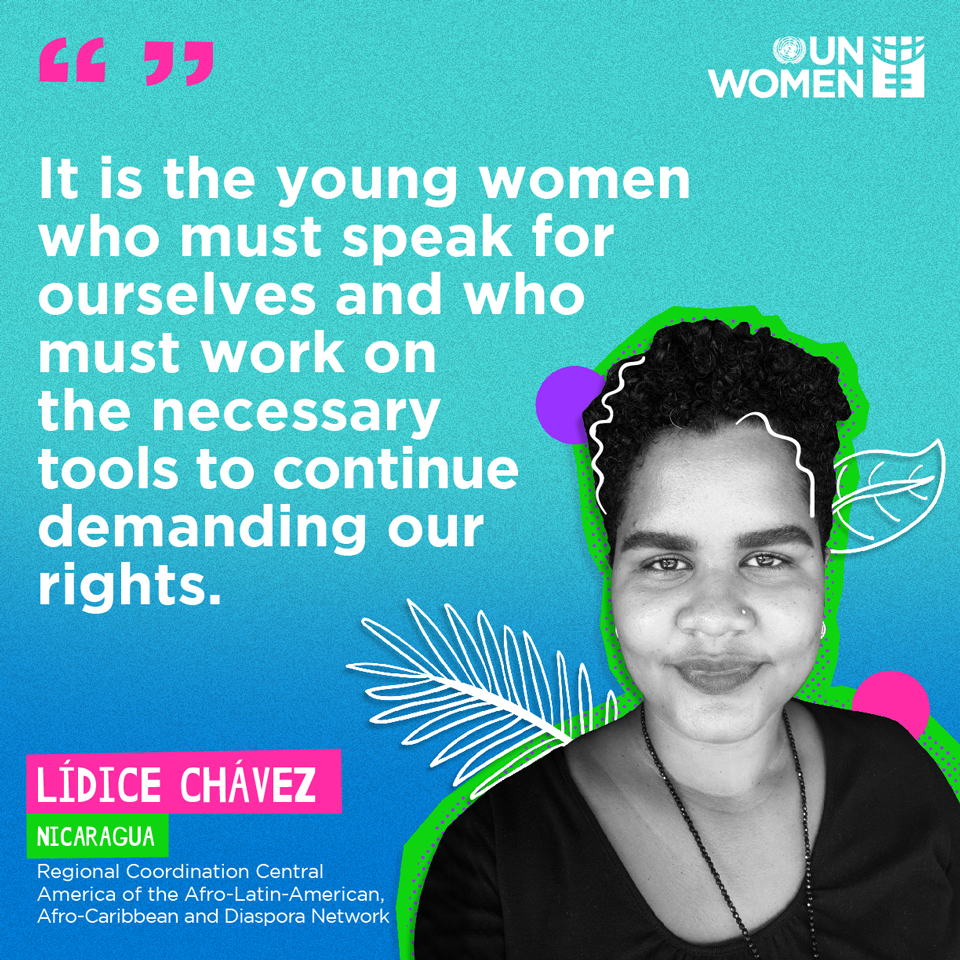
Lídice Chávez Gammie, regional coordinator for Central America, indicates that in her sub-region the network has prioritized the promotion of leadership among Afro-descendant women and youth and their involvement in the development of tools to demand the rights of Afro and multi-ethnic youth and women.
"In light of the growing wave of delegitimization and criminalization of activisms, the network has identified the need to continue strengthening the bases, from the creation of opportunities for reflection geared towards the recognition of self-care, as well as the self-management of protection mechanisms."
The recognition of intergenerational dialogue is part of the essence of the network and constitutes an important pillar for them, reinforcing their identity.
"It is we young women who must speak for ourselves and who must work on the necessary tools to be able to continue demanding our rights. Intergenerational processes are important, and we cannot deny the contribution of the women who have preceded us and those who accompany us on this journey.
"For me, the key has been to be able to find myself in other young women and to be able to re-signify and position my, their and our demands. It has been a challenge to coordinate spaces for young women, due to the resources factor and the great limitation imposed by COVID-19 to get together. However, we have overcome it by shifting our actions and spaces for reflection and collective construction into the digital space."
"With tremendous pride we can say that Afro-descendant women are occupying positions of leadership and decision-making, putting their identity as black women first and opening paths for those that will follow to continue with this task, whose greatest debt is to see that the States still do not recognize the existence of racism," says Milene Molina Arancibia.
It is essential to incorporate the participation of Afro-descendant women in the design and implementation of public policies conceived from an intersectional perspective.
According to ECLAC, their presence in state institutions and power structures at the highest levels is a necessary condition for institutions to be more sensitive to the intersections between gender and race and ethnicity in the design and implementation of public policies and to ensure that policies are more appropriate to the needs and proposals of Afro-descendant women.
The road ahead
Audes Jiménez González assures that "the pending agenda is in the face of the advancement of our political platform. Although progress has been made, it is still very little compared to the needs that Afro-descendant women continue to have."
"We need to continue to advocate before governmental and intergovernmental bodies for the formulation and implementation of public policies that affirm models of development based on the recognition and respect for ethnic, racial and gender identities and the problems common to the entire region, among which poverty, low levels of political participation, migration, violence against women, girls, adolescents and HIV/AIDS stand out."
At the regional level, other Afro-descendant women's groups have joined these efforts to visibilize and vindicate the rights and dignity of Afro-descendant women.
Gloria Nuñez de Silva, coordinator of the Afroamerica XXI Guatemala Association, points out that "we have the challenge of being visible in all decision-making spaces. We have to empower ourselves in formative processes on issues relevant to our real African cultural heritage to awaken our sense of relevance and have the necessary tools for political advocacy."
The UN General Assembly proclaimed 2015-2024 International Decade for People of African Descent, through resolution 68/237, citing the need to strengthen national, regional and international cooperation regarding the full enjoyment of economic, social, cultural, civil and political rights of people of African descent, and their full and equal participation in all aspects of society.
Sustainable development in Latin America and the Caribbean, the most unequal region in the world, will only be possible through an inclusive, multidimensional and intersectional approach that addresses inequalities and prioritizes the most disadvantaged people, particularly people of African descent and other vulnerable populations.
The Regional Gender Agenda, established over 40 years of Regional Conferences on Women in Latin America and the Caribbean, also incorporates the issue of Afro-descendant women and ethnic-racial and gender intersectionality.
As indicated by ECLAC, understanding the situation of Afro-descendant women in Latin America and the Caribbean from a holistic perspective, including a human rights and gender perspective, is only possible based on an intersectional analysis and with a focus on proposals aimed at sustainable development.
